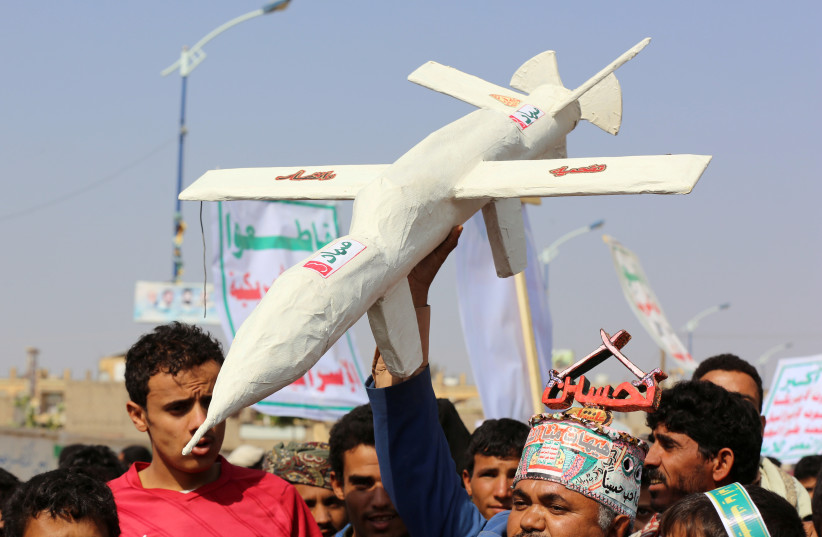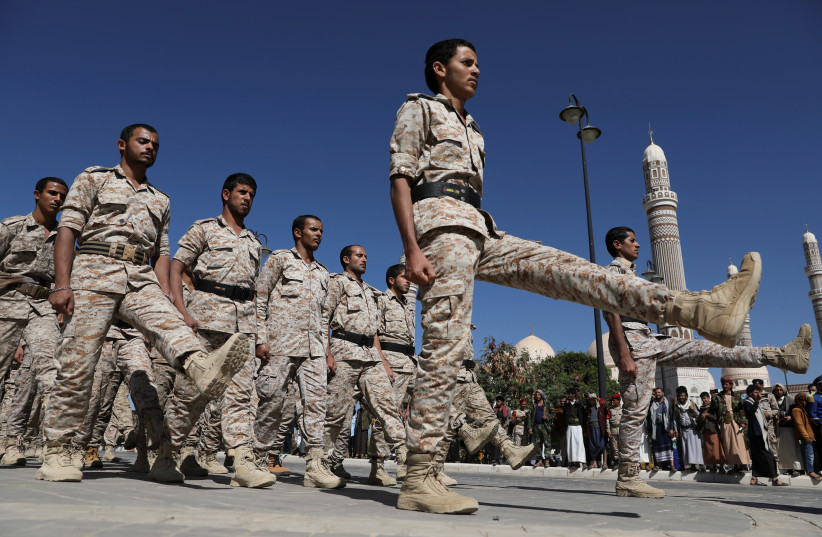The rebel militia group in Yemen recently upped the ante by attacking the UAE, which has caught Israel’s attention.

An attack on the capital of the United Arab Emirates by the Yemeni rebel militia group Ansar Allah, colloquially known as the Houthis, was thwarted on Monday night. The missile attack, the second in a week, was intercepted by American Patriot air defense weapons systems, and failed to reach its targets. Monday’s attack followed a successful strike last week, on a fuel depot in Abu Dhabi, which left three civilians dead. The Saudi-led retaliatory airstrikes killed more than 80, when a Houthi-run prison was hit.
The Houthis have attacked targets on Saudi soil in the past but have until now avoided attacking the UAE. This increased aggressiveness on the part of the Shi’ite organization is causing great concern in the Gulf and also has caught the attention of an Emirati ally to the north, Israel.
The Iran-backed Houthis march under a flag that reads “Allah Akbar, Death to America, Death to Israel, Curse on the Jews, Victory to Islam,” and has made numerous threats against the Jewish state in the past. After this week’s attack on the UAE, Ansar Allah sources told the Arabic-language newspaper al-Akhbar that they are looking to see if Israel is actively involved in support for the Saudi-Emirati pro-government coalition acting in Yemen. If it is, they said, Israeli targets will be added to their list.
Past Houthi threats against Israel never materialized, but the recent escalation has caused Israeli experts to raise the alarm. Omer Dostri, a research fellow at the Jerusalem Institute for Strategy and Security and a national security expert, explains that several elements lend credibility to the Houthi threat.
“It’s true, Yemen is far away [from Israel], but several things need to be taken into account,” Dostri told The Media Line.

At the beginning of January, the Houthis seized a cargo ship in the Red Sea sailing under the Emirati flag, and after this, says Dostri, “you see a high-ranking member of Ansar Allah saying that the operation was a message to the Israeli enemy, that every military action against Yemen will mean that Israeli vessels and [military] bases will be in danger.”
In recent years, Israel and Iran have waged a maritime shadow war. Part of this has included attacks on ships connected to Israeli citizens. Israel has been blamed for attacking numerous Iranian vessels, including oil tankers and navy targets.
Dostri says that the Houthis, close allies of Iran, “may certainly attempt to harm Israeli activities or the country’s freedom of navigation in the Red Sea area, [around] Bab el-Mandeb strait. That is possible. We’re seeing … the Houthis attempt to sabotage Saudi, Emirati and other countries’ ships, acting truly like pirates.”
However, he believes that the main threat to Israel is that of ballistic missiles and drone attacks, not on Israeli soil, but in the Gulf itself. “In the UAE, there are now… a lot of Israeli tourists, diplomats and businesspeople, and the message to Israel from Ansar Allah and Iran here is very clear: currently, we are setting Israeli local targets aside, but we can reach Israeli targets” in the Emirates, Dostri said.
Although Yemen, located at the southern tip of the Arabian Peninsula, is relatively distant from Israel, Dostri points out that Ansar Allah’s attack shows that it is closer than it appears. According to Dostri, “1,800 km is the distance between the [source of] the Houthi attack and the UAE; and between the Houthi-controlled area of Yemen and Eilat the distance is 2,000 km.” Israel’s port city of Eilat is the country’s southernmost area. Future attacks from Yemen are a real possibility, therefore, and Israel must be prepared, he said.
Opinions regarding the credibility of the Houthi rhetoric are not unanimous. Brig. Gen. (ret.) Shlomo Brom, former director of the IDF’s strategic planning division and a senior researcher with Tel Aviv University’s Institute for National Security Studies (INSS), told The Media Line that “the current threat is very low, in my opinion.”
The Houthis “have other, much greater concerns than us. They are fighting a war against [forces that pose] an existential threat to them, so they need to add us to their list of enemies? I don’t think so,” Brom said. This is especially true, he added, considering the fact that the Shi’ite rebels know that Israel is capable of acting effectively against them.
Since 2014, Yemen has been embroiled in a bloody civil war between the internationally recognized government, supported by Saudi Arabia and the UAE, and Ansar Allah, a rebel organization that enjoys Tehran’s backing. The Council on Foreign Relations estimates that approximately 100,000 people have so far lost their lives as a result of the conflict, which has led to one of the world’s worst humanitarian crises. Early in 2021, the Houthis launched an attack on the important, oil-rich Yemeni province of Marib, but recent weeks have seen pro-government forces gain ground against the rebels in the region. They have also managed to push back Houthi advances in the neighboring Shabwa province. Diplomatic efforts seeking to end the war have so far proven unsuccessful.
Brom says that it is a mistake to see Ansar Allah as an Iranian proxy “in a simplistic fashion.” He emphasized that “the Houthis have their own interests, first and foremost.” Their attacks on Abu Dhabi, for example, may be seen as contrary to recent attempts by Iran and the Emirates to warm relations. They reflect, instead of Iranian wishes, Houthi dissatisfaction with the increased involvement of the UAE in Yemen’s civil war.
Dostri believes that the attacks are part of Tehran’s efforts to create pressure and improve its position at the negotiation table in Vienna, where talks about the Iran nuclear deal, called the Joint Comprehensive Plan of Action, have been dragging on with no end in sight. They are also part of Iran’s attempt at weakening the American presence in the region, he said.
In the long run, however, Brom says that Ansar Allah could pose a threat to Israel. “They are building their capabilities, which at some point will likely constitute a threat,” he said. But being able to attack Israel does not mean that they will. It’s a question of the Houthis’ interest, Brom explains, “and that’s harder to predict in the long run.”
Brom considers it improbable that Israel is devoting much-needed and limited intelligence resources to Yemen. If Israel enters into an actual conflict with the Houthis then it will have to devote resources to the effort, he says, however at present, it would not be wise to allocate necessary resources to Ansar Allah.
Dostri says that Israel should act now against Houthi targets in Yemen, to weaken them militarily, and avoid the formation of a second ‘Hizbullah-stan’ or ‘Hamas-stan’ acting against Israel from Yemen. “A Houthi attack against Israel will come, in my opinion, it’s just a matter of time, and [Israel] shouldn’t wait around” for that to happen, he said. Israel’s military should position navy vessels in the Red Sea, he said, from where it should act covertly using drones. In this manner, Israel will prevent a developing significant threat.
Concurrent with its military activities, Dostri suggests that Israel urge the United States to form a regional maritime force to cope with the piracy threat. Jerusalem should also join Abu Dhabi in pressuring the Biden administration to return the Houthis to the US list of foreign terror organizations.
Israeli support for the Saudi-led coalition in Yemen, militarily and diplomatically, could strengthen the already flowering relations between Israel and the Emirates. It could also bring to the Saudis an awareness the benefits of better relations with Jerusalem.
Content retrieved from: https://www.jpost.com/arab-israeli-conflict/article-694843.